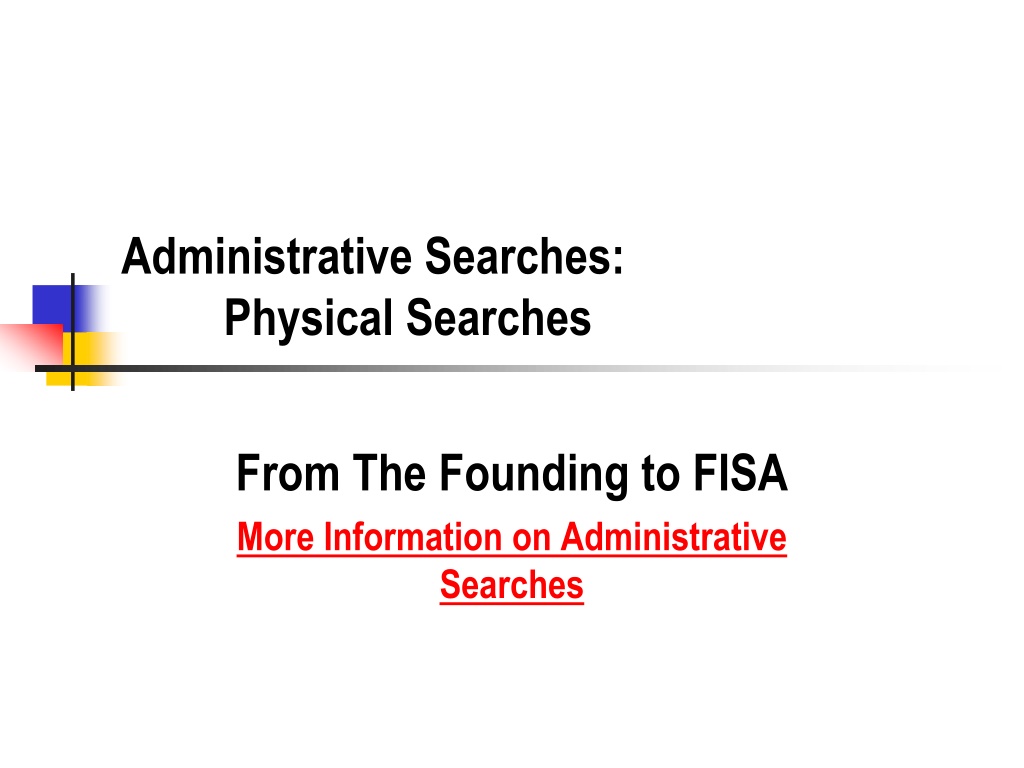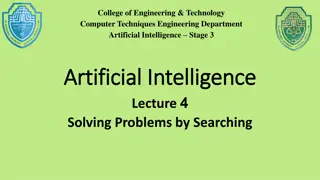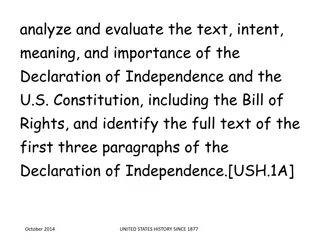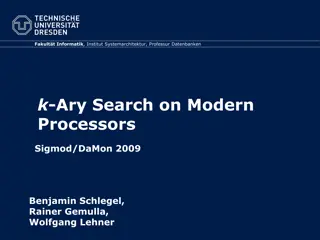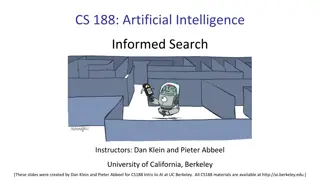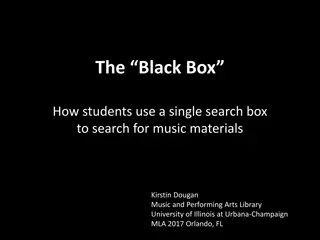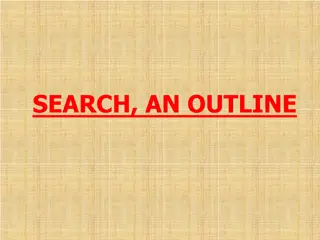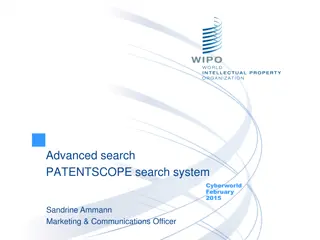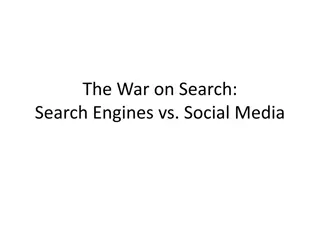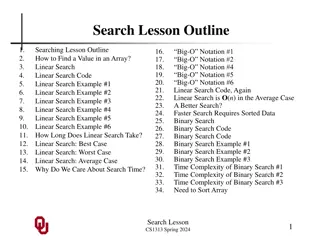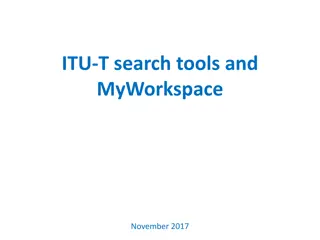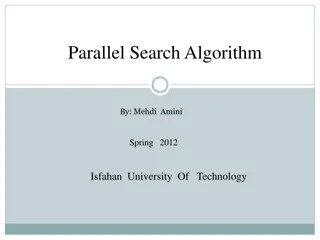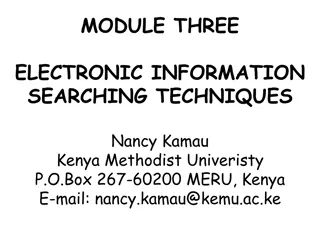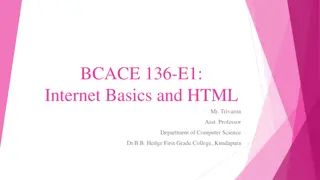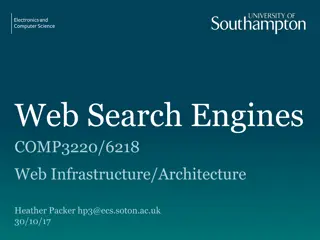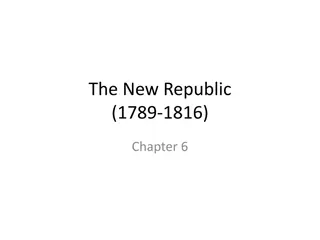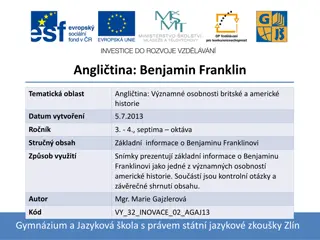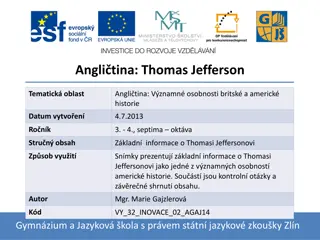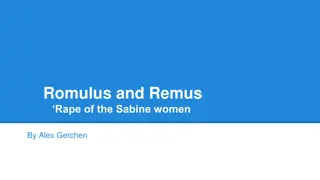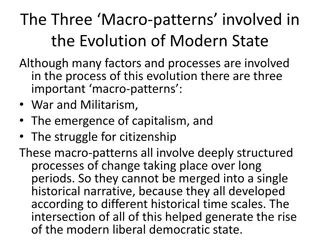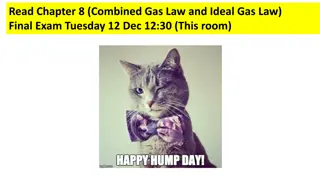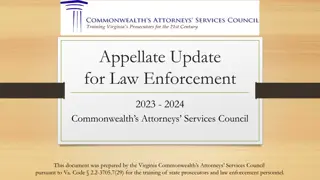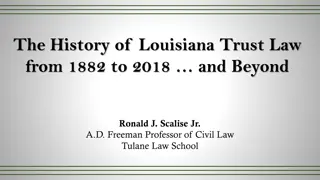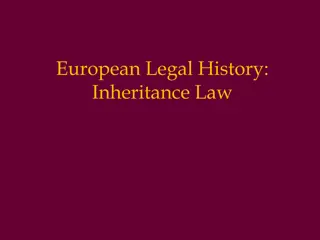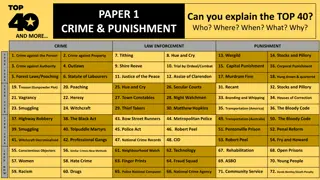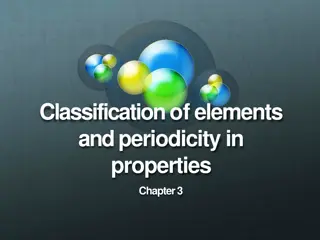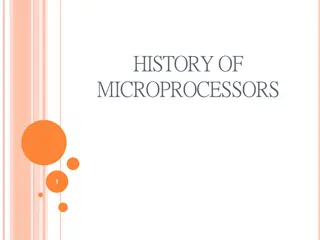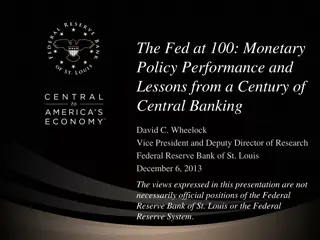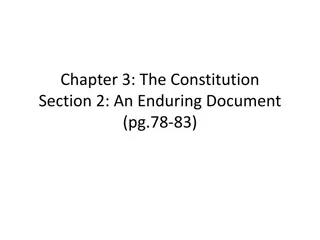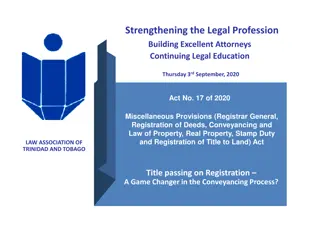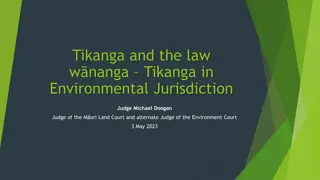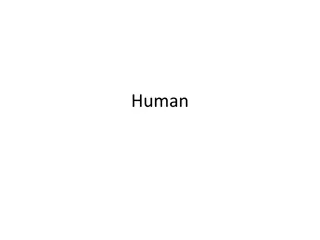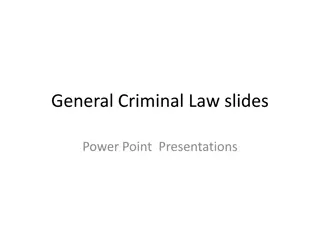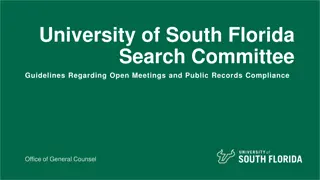Evolution of Search Law: From Founding to Modern Day
Cultural and legal perceptions of searches have evolved significantly over time, influenced by media portrayal and significant events like 9/11. The presentation explores the historical background of search laws, highlighting the Fourth Amendment's role as an exception. It also raises an important unresolved question regarding the limitations of materials obtained during searches.
Download Presentation

Please find below an Image/Link to download the presentation.
The content on the website is provided AS IS for your information and personal use only. It may not be sold, licensed, or shared on other websites without obtaining consent from the author. Download presentation by click this link. If you encounter any issues during the download, it is possible that the publisher has removed the file from their server.
E N D
Presentation Transcript
Administrative Searches: Physical Searches From The Founding to FISA More Information on Administrative Searches
Cultural Knowledge of Searches Most laypersons, and many lawyer's perceptions of search law are created by the popular media Every police show has a recurring plot line about the evidence obtained with the questionable warrant or without a warrant Every courtroom drama has its fights over the exclusion of improperly obtained evidence Prior to 9/11, these criminal law searches were all most people knew about. 2
Post-9/11 Cultural Knowledge of Searches The media is now saturated with antiterrorism themed programming that show shadowy agencies that seem completely unfettered by law. The NSA is caught exceeding its authority by intercepting all phone traffic and the result is that it is given more authority. Edward Snowden showed us that the NSA is exceeding all bounds and lying to congress about it. Some NSA authority is limited will they obey? 3
The Death of Privacy Facebook Your personal information as commodity Cell phone Your personal tracking device Google All your deepest secrets as commodity You are now the product 4
Searches in Law School Teaching Law students typically spend about an hour on administrative searches in criminal law Burger, Biswell, and the doctrine of pervasively regulated industries Seen as an exception to the general rule that a search must be based on a 4th Amendment warrant In reality, the 4th Amendment warrant requirement is better seen as a fairly narrow exception to the right to search on a general warrant or no warrant at all. 5
Objective of this Presentation Show that it is the 4th amendment warrant requirement that is the exception. Give you the historic background to evaluate modern administrative search law. Introduce the core unsolved problem (not addressed by the United States Supreme Court): Is the use of the materials obtained limited by the purpose of the original search? 6
Fourth Amendment "The right of the people to be secure in their persons, houses, papers, and effects, against unreasonable searches and seizures, shall not be violated, and no Warrants shall issue, but upon probable cause, supported by Oath or affirmation, and particularly describing the place to be searched, and the persons or things to be seized." 7
Criminal Law Searches The Exclusionary Rule 8
Criminal Law Searches What does the 4th Amendment require for searches to find evidence in criminal prosecutions? Warrant that specifically describes the premises to be searched and what is being sought Probable cause based on reliable information Independent magistrate approval 9
Anticipatory Warrants An anticipatory warrant is a warrant that is triggered by a future event, such as the delivery of a drug shipment. It requires specific probable cause, i.e., the warrant must spell out the triggering event in detail, meaning that the police cannot use these unless they know about the crime. United States v. Grubbs, 547 U.S. 90 (2006) 10
Delayed Notice (Sneak and Peek) Warrants Traditional criminal law search warrants require the police to knock and announce that they are searching. Puts the target on notice of the search and its purpose. Delayed notice warrants allow secret searches. The target must be notified eventually, unless there is good reason not to. Originally limited to FISA (Foreign Intelligence Surveillance Act) warrants, but now generally available. 11
Enforcement of the 4th Amendment Common law remedies Trespass, invasion of privacy Exclusionary rule Only triggered when the evidence is used in a criminal trial Weeks v. United States, 232 U.S. 383 (1914) Mapp v. Ohio, 367 U.S. 643 (1961) 12
Exceptions to the Exclusionary Rule No expectation of privacy (plain view) Public places Ancillary to warrant Special circumstances Border check points Automobile searches Exigent Circumstances No longer cell phones 13
Private Entities and the Constitution The Constitution limits government actions only . The Congress can pass laws applying constitutional principles such as Civil Rights Acts to private entities. Congress has not applied 4th Amendment principles to private parties. There are no limitations on private parties providing information to the government. 14
Silver Platter Doctrine Private individual can collect evidence without a warrant, or even illegally, and give to the police. Must act independently of the government. Cannot be government agent Elkins v. United States, 364 U.S. 206 (1960) State police illegally obtain evidence and hand it to federal police No silver platter doctrine, both are state actors 15
Administrative Searches Public Health and Safety Searches 16
Public Health and Safety Searches Vermin control (rats) Building code violations / dangerous buildings Occupancy violations Communicable disease control Fire inspections Sanitation violations 17
Frank v. Maryland, 359 U.S. 360 (1959) The First 158 Years of Admin Searches What is Frank about? http://biotech.law.lsu.edu/cases/searches/frank _v_maryland.htm This is a criminal conviction for refusing to allow a warrantless administrative inspection of a private home. 18
The Enabling Act "Whenever the Commissioner of Health shall have cause to suspect that a nuisance exists in any house, cellar or enclosure, he may demand entry therein in the day time, and if the owner or occupier shall refuse or delay to open the same and admit a free examination, he shall forfeit and pay for every such refusal the sum of Twenty Dollars." 19
Is a Man's Home His Castle? "In 1765, in England, what is properly called the great case of Entick v. Carrington, 19 Howell's State Trials, col. 1029, announced the principle of English law which became part of the Bill of Rights and whose basic protection has become imbedded in the concept of due process of law. It was there decided that English law did not allow officers of the Crown to break into a citizen's home, under cover of a general executive warrant, to search for evidence of the utterance of libel." 20
Does the 4th Amendment Bar all Warrantless Searches? "Certainly it is not necessary to accept any particular theory of the interrelationship of the Fourth and Fifth Amendments to realize what history makes plain, that it was on the issue of the right to be secure from searches for evidence to be used in criminal prosecutions or for forfeitures that the great battle for fundamental liberty was fought. " 21
Does History Matter? "The Fourteenth Amendment, itself a historical product, did not destroy history for the States and substitute mechanical compartments of law all exactly alike. If a thing has been practiced for two hundred years by common consent, it will need a strong case for the Fourteenth Amendment to affect it, . . . ." Jackman v. Rosenbaum Co., 260 U.S. 22, 31. (1922)(Holmes) 22
Have Times Changed? The power here challenged rests not only on a long history of its exercise. It is a power which was continually strengthened and applied to wider concerns through those very years when the right of individuals to be free from peremptory official invasion received increasing legislative and judicial protection. Nor is this a situation where a new body of knowledge displaces previous premises of action. There is a total want of important modification in the circumstances or the structure of society which calls for a disregard of so much history. 23
Are These Searches Still Necessary? "The need for preventive action is great, and city after city has seen this need and granted the power of inspection to its health officials; and these inspections are apparently welcomed by all but an insignificant few. Certainly, the nature of our society has not vitiated the need for inspections first thought necessary 158 years ago, nor has experience revealed any abuse or inroad on freedom in meeting this need by means that history and dominant public opinion have sanctioned." 24
Why Not Require a Warrant? "If a search warrant be constitutionally required, the requirement cannot be flexibly interpreted to dispense with the rigorous constitutional restrictions for its issue. A loose basis for granting a search warrant for the situation before us is to enter by way of the back door to a recognition of the fact that by reason of their intrinsic elements, their historic sanctions, and their safeguards, the Maryland proceedings requesting permission to make a search without intruding when permission is denied, do not offend the protection of the Fourteenth Amendment." 25
The Dissent Douglas, Black, Warren, and Brennan 26
What was Entick v. Carrington Really About? "In the effort to destroy the freedom of the press, by a strained exercise of the prerogative a general warrant was issued in 1763 for the discovery and apprehension of the authors and printers (not named) of the obnoxious No. 45 of the North Briton, which commented in severe and offensive terms on the King's Speech at the prorogation of Parliament and upon the unpopular Peace of Paris recently (February 10, 1763) concluded. Forty-nine persons, including Wilkes, were arrested under the general warrant; and when it was ascertained that Wilkes was the author, an information for libel was filed against him on which a verdict was obtained." 27
Another View of History "The basic premise of the prohibition against searches was not protection against self- incrimination; it was the common-law right of a man to privacy in his home, a right which is one of the indispensable ultimate essentials of our concept of civilization... It belonged to all men, not merely to criminals, real or suspected... To say that a man suspected of crime has a right to protection against search of his home without a warrant, but that a man not suspected of crime has no such protection, is a fantastic absurdity." 28
Are Health Inspections so Threatening? "One invasion of privacy by an official of government can be as oppressive as another. Health inspections are important. But they are hardly more important than the search for narcotic peddlers, rapists, kidnappers, murderers, and other criminal elements. As we have seen, searches were once in their heyday when the government was out to suppress the nonconformists... Many today would think that the search for subversives was even more important than the search for unsanitary conditions." 29
Do Most People Cooperate? "Figures submitted by the Baltimore Health Department show that citizens are mostly cooperative in granting entrance to inspectors. There were 28,081 inspections in 1954; 25,021 in 1955; 35,120 in 1956; 33,573 in 1957; and 36,119 in 1958. And in all these instances the number of prosecutions was estimated to average one a year. Submission by the overwhelming majority of the populace indicates there is no peril to the health program. One rebel a year (cf. Whyte, The Organization Man) is not too great a price to pay for maintaining our guarantee of civil rights in full vigor." 30
Is the Dissent Right? Does the low number of resisters really tell us the administrative cost of a warrant requirement? What might make that number too low? Does the Majority's separation of criminal and administrative searchers make sense? This sets up Camera and See. 31
How does the World Change Between 1959 and 1967? Mapp v. Ohio Miranda v. Arizona Free Speech Movement (The Beats) Vietnam war and the anti-war movement Hippies 1967 is the Summer of Love Civil Rights Movement How does set up the court for Camera? 32
Camara v. Municipal Court, 387 U.S. 523 (1967) Where did this happen? San Francisco What violations were the housing inspectors looking for? Violation of the occupancy permit What crime was defendant charged with? Not allowing the inspection Factually the same as Frank 33
The Municipal Ordinance "Sec. 503 RIGHT TO ENTER BUILDING. Authorized employees of the City departments or City agencies, so far as may be necessary for the performance of their duties, shall, upon presentation of proper credentials, have the right to enter, at reasonable times, any building, structure, or premises in the City to perform any duty imposed upon them by the Municipal Code." 34
The Writ of Prohibition What are the defendant's allegations of unconstitutional actions? Unconstitutional search under the 4th Amendment, as applied to the states by the 14th Amendment Not granted by the state courts 35
Why is the Intent of the Search Critical? Since the inspector does not ask that the property owner open his doors to a search for "evidence of criminal action" which may be used to secure the owner's criminal conviction, historic interests of "self-protection" jointly protected by the Fourth and Fifth Amendments are said not to be involved, but only the less intense "right to be secure from intrusion into personal privacy." (Camara) 36
Does a Warrant Requirement Mean No Searches? In assessing whether the public interest demands creation of a general exception to the Fourth Amendment's warrant requirement, the question is not whether the public interest justifies the type of search in question, but whether the authority to search should be evidenced by a warrant, which in turn depends in part upon whether the burden of obtaining a warrant is likely to frustrate the governmental purpose behind the search. (Camara) A precedent for Matthews? 37
Standards for Criminal Probable Cause "For example, in a criminal investigation, the police may undertake to recover specific stolen or contraband goods. But that public interest would hardly justify a sweeping search of an entire city conducted in the hope that these goods might be found. Consequently, a search for these goods, even with a warrant, is "reasonable" only when there is "probable cause" to believe that they will be uncovered in a particular dwelling." 38
Government Interest in Public Health Searches The primary governmental interest at stake is to prevent even the unintentional development of conditions which are hazardous to public health and safety. Because fires and epidemics may ravage large urban areas, because unsightly conditions adversely affect the economic values of neighboring structures, numerous courts have upheld the police power of municipalities to impose and enforce such minimum standards even upon existing structures. 39
General Versus Specific Probable Cause There is unanimous agreement among those most familiar with this field that the only effective way to seek universal compliance with the minimum standards required by municipal codes is through routine periodic inspections of all structures. It is here that the probable cause debate is focused, for the agency's decision to conduct an area inspection is unavoidably based on its appraisal of conditions in the area as a whole, not on its knowledge of conditions in each particular building. 40
Punishment versus Prevention Why is criminal law retrospective? Why is a crime the predicate to probable cause? Even when you are trying to prevent a crime, you need criminal predicate acts. Prevention is about preventing harm, not about prosecuting a crime, even if the future harm is a crime. No crime - no probable cause. 41
Factors Supporting General Probable Cause First, such programs have a long history of judicial and public acceptance. Second, the public interest demands that all dangerous conditions be prevented or abated, yet it is doubtful that any other canvassing technique would achieve acceptable results. Finally, because the inspections are neither personal in nature nor aimed at the discovery of evidence of crime, they involve a relatively limited invasion of the urban citizen's privacy. 42
The Frank Consensus "Time and experience have forcefully taught that the power to inspect dwelling places, either as a matter of systematic area-by-area search or, as here, to treat a specific problem, is of indispensable importance to the maintenance of community health; a power that would be greatly hobbled by the blanket requirement of the safeguards necessary for a search of evidence of criminal acts." 43
Preventing Harm versus Punishing Criminals "The need for preventive action is great, and city after city has seen this need and granted the power of inspection to its health officials; and these inspections are apparently welcomed by all but an insignificant few. Certainly, the nature of our society has not vitiated the need for inspections first thought necessary 158 years ago, nor has experience revealed any abuse or inroad on freedom in meeting this need by means that history and dominant public opinion have sanctioned." 44
Standards for an Area Warrant Such standards, which will vary with the municipal program being enforced, may be based upon: the passage of time the nature of the building (e. g., a multi-family apartment house) the condition of the entire area [T]hey will not necessarily depend upon specific knowledge of the condition of the particular dwelling. 45
Emergency Exceptions [N]othing we say today is intended to foreclose prompt inspections, even without a warrant, that the law has traditionally upheld in emergency situations 46
Examples of Emergencies North American Cold Storage Co. v. City of Chicago, 211 U.S. 306 (seizure of unwholesome food); Jacobson v. Massachusetts, 197 U.S. 11 (compulsory smallpox vaccination); Compagnie Francaise v. Board of Health, 186 U.S. 380 (health quarantine); Kroplin v. Truax, 119 Ohio St. 610, 165 N. E. 498 (summary destruction of tubercular cattle) 47
Practical Considerations When does the Court say is the time to get an area warrant? Why would this be burdensome to the agency? What would you suggest as an alternative? Would this be consistent with the dissent in Frank observations about compliance? 48
See v. Seattle, 387 U.S. 541 (1967) Routine fire inspection of a commercial warehouse Done as part of a city-wide sweep Owner was prosecuted for refusing to allow the inspection 49
Key Question Do business establishments have a diminished expectation of privacy under the 4th Amendment? "The businessman, like the occupant of a residence, has a constitutional right to go about his business free from unreasonable official entries upon his private commercial property. " 50
